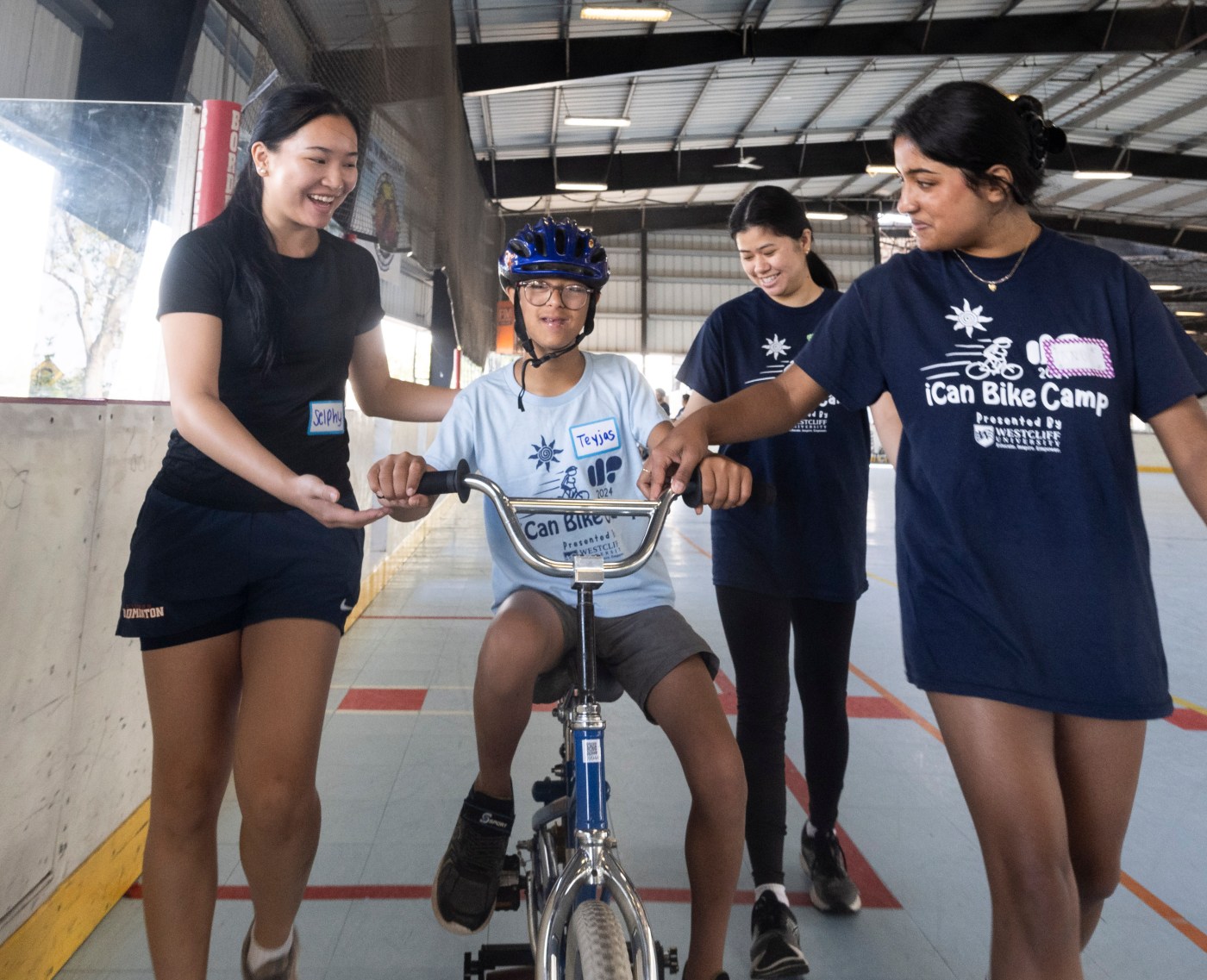On a warm summer day in Orange County, loud music plays as a group of excited youth, going around in circles, are eagerly learning to ride bicycles.
The participants are part of an annual summer program for developmentally disabled youth called “iCan Bike” — hosted at The Rinks Irvine Inline, a roller skating rink.
The goal for the week-long camp, which ends Aug. 9, is for individuals with disabilities to learn to ride a two-wheeled bike, “fostering confidence, independence and joy,” officials said.
The event is put on by nonprofit iCan Shine, which holds camps throughout the country that provide inclusive recreational opportunities for disabled youth ages 8 to 22. From swimming and dancing, to riding bikes, “movement and play” are the basis for all iCan Shine programs, with every effort acknowledged for each person’s abilities, officials said.
Around 40 youth with varying disabilities participated in the Irvine camp, organized by Westcliff University and Unlimited Possibilities — a Santa Ana-based organization that offers support services and programs for children and families with disabilities. Over 100 volunteers signed up, from local high schoolers to students from UC Irvine and Westcliff University.
Over 80% of people with autism and 90% of those with Down syndrome never learn to ride a two-wheel bicycle, iCan Shine officials said.
By the end of the program, about 80% of participants learn to ride a two-wheel bike by themselves.
“Having a child be able to get up on two wheels and feel that level of independence pushes them forward for their future. It’s that first initial step, so that they can then do all the great things they’re going to do in their future,” said Christina Garkovich, Chief Advancement Officer with Unlimited Possibilities.
The iCan Bike Camp has been running for a decade, minus a few due to the COVID-19 pandemic. Garkovich said it’s important the program continues to run because every child deserves to achieve this childhood landmark — no matter their ability.
The week-long camp is split into small sessions, with each camper assigned volunteers to accompany them for the week, helping the camper “gain confidence” in their skills, Garkovich said.
Day one starts with learning how to get onto the bike, riding slowly around the rink on the provided adaptive bikes, which have a regular-sized wheel up front and a horizontal cylinder in the back. It helps riders realign themselves when they get off-balanced. As they ride, camp volunteers walk closely behind and guide the riders throughout. Soon, many of the participants start riding fast enough for the volunteers to jog behind them.
The campers also ride on tandem bikes with staff members, teaching them to pedal. By the end of the week, most of the campers start riding on their own.
Garkovich said the program is teaching all kids a greater level of independence, as well as “inclusivity of being together in this group environment, seeing other kids who are like them.”
Keira Rosen, 13, was excited to learn to ride a bike for the first time without training wheels. The biggest challenge she faced was her lack of balance, as she sometimes struggles to walk straight.
With the iCan Bike adaptive bike, Rosen has been learning how to pedal correctly, as she rode in endless circles around the rink. Her voice filled with excitement as she talked about pedaling as fast as she could, leaving the volunteers running behind her. As she began to lose control, the volunteers were right there to stop her.
Westcliff University softball coach and iCan Bike camp volunteer Desarae Moreno said the team focuses on giving back to the community, and feels that the camp is a perfect way to do that. She noticed many of the kids have a “competitive” side that comes out, seeing how fast they can make their volunteers run.
Related links
From performers to Paralympians, Southern California’s disabled community is diverse
DOJ settles with LA County over disabled access at voting centers
Long Beach Disability Pride celebrates 3rd annual event in downtown Long Beach
Disneyland cracks down on Disability Access Service misuses and abuses
Camp is totally RAD opportunity for these 128 adults
Garkovich’s daughter, Grace, participated in the camp several years ago and now volunteers as a teacher. The 14-year-old was inspired by her time at iCan Bike Camp, adding that her volunteer assistants were “very supportive” which helped her gain the confidence to ride on two wheels.
Learning how to ride a bike is a rite of passage, she said, teaching independence and perseverance for kids to take with them into the future.
Applications for next year’s iCan Bike Camp open next spring 2025.





